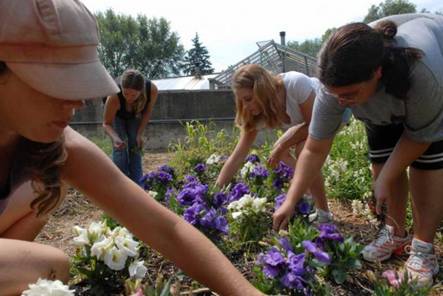July 13, 2012

Horticulture and Pest Control Tips from Cornell Cooperative Extension of Nassau in East Meadow:
LANDSCAPE
Honey Locust: We have had many samples of partially defoliated honey locust. This damage is from Honey Locust Plant Bugs. New growth on heavily defoliated Honeylocusts should be watched for possible later damage from plant bugs and treated if necessary to prevent a second loss of foliage.
Japanese beetle adults are active. They are nearly ½ inch long, broadly oval, thick bodied, and have brown wing covers and metallic green bodies. The adults feed on fruits, flowers, and leaves of many plants. Symptoms include skeletonized foliage followed by defoliation. If management is needed treat during July through mid-August (1029 – 2154 GDD50). Several applications may be necessary. Do not use pheromone traps because they will only bring more Japanese beetles into a property.
Spruce Spider Mite: If your spruce trees are lacking vigor, check for crawlers of Spruce Spider Mites which feedon new growth. As the insects produce honeydew, some sooty mold may be evident on infested trees, Look closely at the base of shoots.Treat the crawlers in late June or July with horticultural oil, insecticidal soap, neem oil or other registered pesticide between 912 – 1388 GDD50.
Cooley Spruce Gall Adelgid —The pineapple-shaped galls caused by this adelgid will begin to open soon on blue spruce. If they are few, you can just prune them off and dispose of them Colorado spruce and Douglas-fir are the two major ‘On spruces, these galls eventually die, resulting in slowed growth of the spruce tree and sparsely filled in branches. Many people think that the galls are seed cones and a few galls may not warrant control. Dormant oil sprays have been used to control this pest. Fall sprays are applied in late-October and early-November while spring sprays are applied before bud swell. Great care must be taken so as not to spray actively growing trees as this will result possible burn of the new growth. Dormant oil will also turn glaucous (silver or grey colored) spruces dark green. The glaucous color may not return until new growth is formed.
LAWN
Lawn care has been tough with the extreme hot weather. Most important maintain proper irrigation. Do not over water, as you will encourage fungal diseases. Make sure customers are irrigating in the Early AM, and reduce foot traffic as much as possible. Don’t leave things on the lawn such as hoses, bicycles; the lawn will be damaged from the heat buildup.
Studies have shown seaweed based products help with heat tolerance: Read the Label.
For sports fields, with a high % of Kentucky Blue Grass, if not being used, allow to go dormant, and avoid all traffic including mowing. Or irrigate carefully to sustain growth and minimize traffic
Use Cornell Pest Management Guides for specific pesticide recommendations. http://impguidelines
Recommendations for the use of chemicals in this email as a convenience to the reader. The use of brand names and any mention or listing of commercial products does not imply endorsement by Cornell Cooperative Extension Service nor discrimination against similar products or services not mentioned.
For more sustainable gardening information and fact sheets go to http://www.ccenassau.org
Walk in Diagnostics: Hours: Tuesday: 10:00 - 4:00 - Wednesday & Thursday 10:00 - 1:00 - 832 Merrick Avenue, East Meadow, NY

